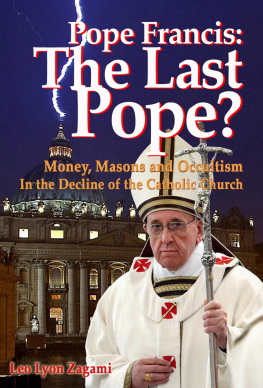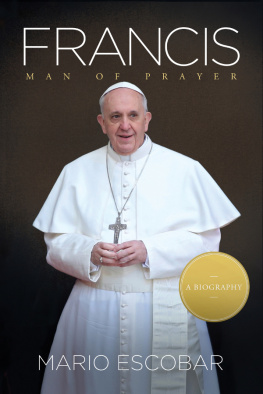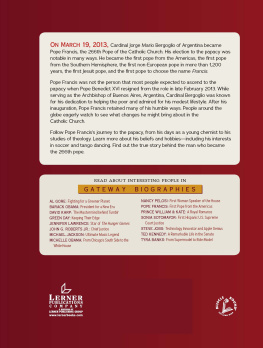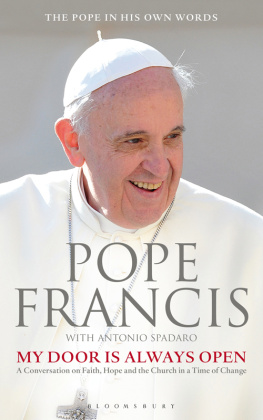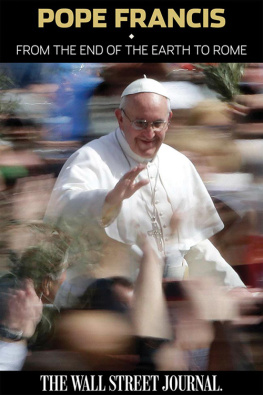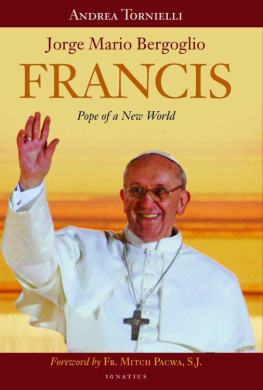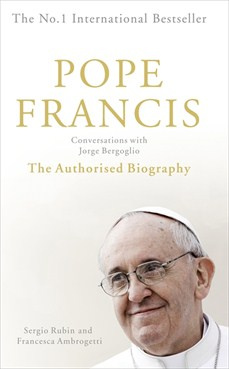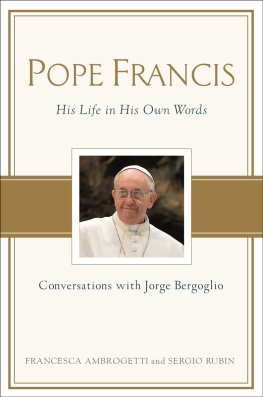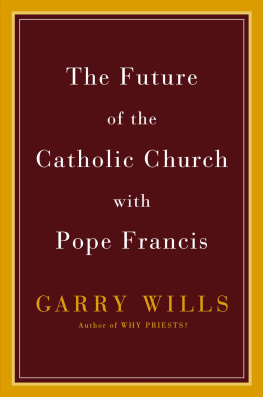Francis
A Pope for Our Time
The Definitive Biography
By Luis Rosales and Daniel Olivera
Francis: A Pope for Our Time
2013 Humanix Books
All rights reserved
No part of this book may be reproduced or transmitted in any form or by any means, electronic or mechanical, including photocopying, recording, or by any other information storage and retrieval system, without written permission from the publisher. For information, contact:
Humanix Books
P.O. Box 20989
West Palm Beach, FL 33416
USA
www.humanixbooks.com
email:
Humanix Books is a division of Humanix Publishing LLC. Its trademark, consisting of the words Humanix Books is registered in the U.S. Patent and Trademark Office and in other countries.
Printed in the United States of America and the United Kingdom.
ISBN (Hardcover) 978-1-63006-002-2
ISBN (E-book) 978-1-63006-005-3
Library of Congress Control Number 2013941319
To my mother, who was with me until the end. To the memory of my father. To Mara de los ngeles, Ariel, Ignacio, Marcos, and Martn. And to the Olivera, Miranda, Lpez-Maurizzi, and Belloni families.
Daniel Olivera
To my parents, my sister, and my nephews, for their constant support; to my Buenos Aires and Mendoza friends; to Marcelo Giugale, Javier Pose, and Nicols Pasaman, for their invaluable contributions.
Luis Rosales
For two Argentine journalists, as are both authors of this book, to write and tell the world about Pope Francis is like describing a part of ourselves. We approached it in two parts. The first, by Daniel Olivera, describes the man and his life; the second, by Luis Rosales, focuses on his doctrine and the challenges that lie ahead.
Humanix Books called upon us precisely given these two conditions: our profession and our nationality. As social commentators, the Pope mania that broke out in Argentina as a consequence of his election is an especially interesting phenomenon for us to observe, and it will probably create an impact that will last a long time. The news coverage of Francis almost surprise ascent to Peters Throne, as well as the enormous amount of attention paid to his every action and gesture, are just a prelude to an influence that will become much more than just a passing fad. We belong to a global society, interconnected and instant a world in crisis where ideologies are exhaustively discussed and yet where peoples attention barely lasts as long as a TV segment, a few messages on a social network, or a few minutes on a website. That is why the possibility of the renewal and strengthening of a stable and permanent institution such as the Catholic Church is at the very least an interesting subject to analyze even more so if the new leadership in Rome is willing to question, from its own standpoint, the practices, customs, and traditions of one of the worlds most influential organizations.
The Catholic Church is going through a profound crisis. Beyond internal institutional and doctrinal struggles, it is also faced with the strong and growing tendency of people today to distance themselves from spirituality. Advancements in science and technology have embedded the idea of godlessness in society, without considering how these formidable achievements of modern life can help lead to a more transcendent objective. Hence, Pope Francis arrival is deeply moving and emotional to a community in dire need of direction and spiritual renewal. His humility and simplicity, combined with his proven political prowess and his ability to communicate, create reason to hope that the Vatican will change its course after years of abandoning the essence of Christs teachings and path.
Many hope Francis will be a dogmatic reformer and that he will modernize the institution over which he presides, following the pulse of public opinion. But these hopes are the antithesis of Francis philosophy. He strongly believes, and has shown it throughout his pastoral life, that following the changing winds of public opinion is unnecessary in order to be influential or successful. He knows his role is more analogous to that of a lighthouse that must signal the presence of cliffs and dangers, especially during stormy nights, pointing out the boundaries where mankind seriously risks losing sight of its own meaning and reason for existence.
Conservative and strict when it comes to the dogmatic and an almost irreverent reformer when it comes to the symbolic, Francis promises to leave his mark.
His name choice Francis defines his path. Invoking the wisdom, discipline, and politics of the Jesuit order, it stands at the intersection where piety, dialogue, and Franciscan humility meet. Without altering the essence of faiths doctrines, his personal stamp and life example will cause a profound renaissance in the Churchs practices and internal life, which have strayed considerably from Christs original mandate to Peter. Ending the constant intrigue and destructive bureaucracy governing from the Vaticans palaces will be no easy task. It never has been easy, but during these last few years, the distortions have reached a point comparable to the worst of times, when the Pope was more akin to a ruler, with power, authority, and even armies. There will likely be much resistance, but choosing a man from the order created by Saint Ignatius of Loyola seems like the right path. It is perhaps a paradox of destiny that the so-called, first Black Pope (referring to the black garb of the Jesuit order) has been chosen to maintain the pristine, white vestment that symbolizes Peters successor.
Francis will have to bring transparency to the Vaticans financial management, not only to push away doubts and suspicions, but also to clean up the coffers and be able to plan for future pastoral and charitable work. But that will only be the beginning, as his impact will be felt beyond the walls that surround Vatican City. The Catholic Church, with its 1.2 billion believers (almost 17 percent of humankind), constitutes the biggest religious organization in the world. In addition, it is the Christian familys core. Together with the eastern churches (divided in the schism of 1054) and the Protestant diaspora (a product of sixteenth-century reform), it represents the beliefs of more than a third of the people on the planet. Yet the divisions between the various branches of Christianity remain as entrenched as ever.
As a cardinal, Francis demonstrated in infinite instances that he is open to dialogue and meetings, and as the current Pope, unity and consensus remain key words in his lexicon and thoughts. His humble introduction to the world stage emphasizing his role as Romes bishop rather than highlighting the pomp of the Papacy was not only a transcendent gesture, but almost an essential condition as he attempts to unify the Catholic Church, its followers, and fellow members of the Christian faith.
But his calling to unite goes even beyond this. While in Buenos Aires, he was in constant dialogue with representatives of other creeds, especially Judaism and Islam. A common enemy threatens all of them. The apparent triumph of Nietzsches idea that God is dead is clearly manifest in the fact that millions of people live and die without even questioning who created them or why. That is why an interreligious dialogue will be an important issue for Francis, as it always has been.
Leading by example with his life, his gestures, and his thoughts, Francis work with the poor demonstrates firsthand our collective obligation to help, genuinely and without assumption, those who are in need. His spiritual ancestors Saint Francis of Assisi and the Piedmontese saints, Don Bosco, Don Cafasso, and Don Orione illustrated a path he has always followed: to help in times of crisis and bestow the tools for betterment upon those in need, distributing fish to satisfy hunger, while also teaching how to fish.


